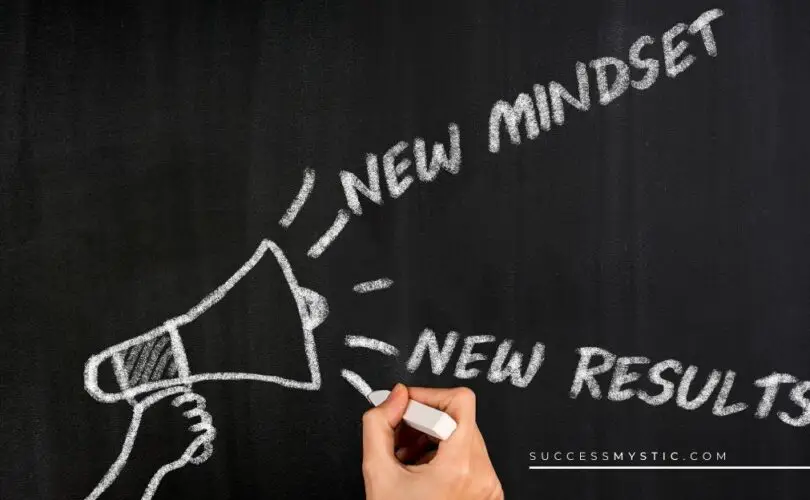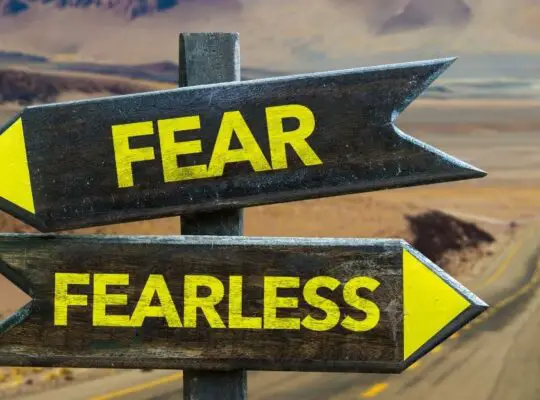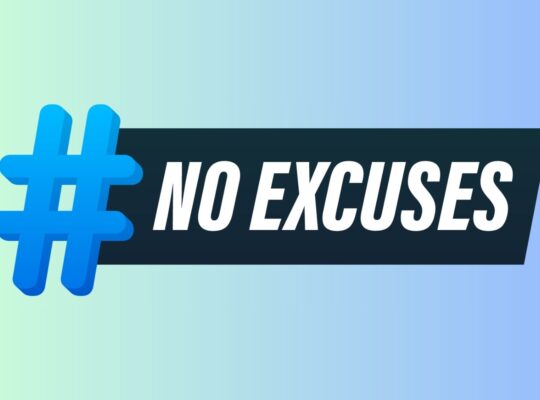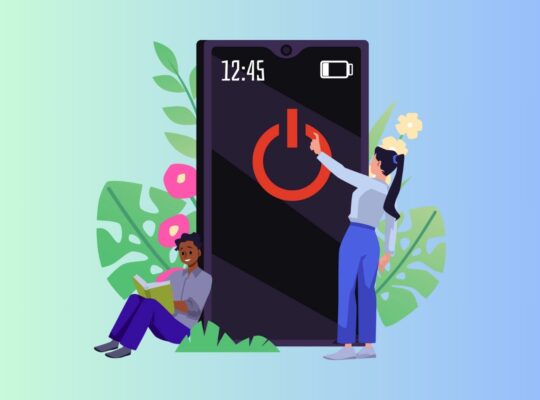Unfortunately, having a negative self image is common among many different types of people. We often compare our lives directly to the successes of others, dream of meeting goals we feel like we can’t achieve, and don’t always see ourselves as deserving of having good things.
If you find yourself naysaying different aspects about yourself and your life, you aren’t alone–even the most polished and put-together people have moments of self doubt. It’s a struggle everyone faces at one point or another in life, and for some people, it can be incredibly difficult to embrace a more positive attitude about themselves.
Learning to change negative naysaying into a more positive perspective can work wonders in your life. When you swap negative habits for positive ones, you allow yourself to build a Yes Mindset. People with Yes Mindsets approach life’s problems and challenges with the right kind of positivity to see themselves through the challenge.
Learning to replace naysaying for more positive habits takes time, but it is possible to change to a Yes Mindset and take control over how you view yourself and choose to build your future. With a few tips and tricks, you can begin transforming yourself into a Yes Mindset person with a more positive outlook on life.
Why do people tend to have such negative feelings about themselves?
According to VeryWell Mind, people tend to naturally have a negativity bias. Although we enjoy peace and happiness, the human mind tends to linger on negative thoughts.
For example, if someone wrongs or disappoints you, you may find yourself dwelling on the negative feelings and fallout for days afterward. When something terrible or tragic happens to someone else, you may linger on the news reports and other media covering the events. Why do we hold on to this negativity bias when, ultimately, we want to be happier and more positive people?
The main reason why humans are naturally wired this way is because the brain is more impacted by negativity than positivity.
Here are a few examples of how this negativity bias may affect your daily life:
- You can remember something mean someone said about you years ago.
- A traumatizing childhood experience can cause lingering fears long after it’s ended.
- We tend to remember critical feedback more clearly than positive comments.
- Emotions and physical reactions are more extreme to negative stimuli versus positive stimuli.
- You dwell on memories about an unfortunate event longer than a happy one.
VeryWell Mind also describes humans’ tendencies to accept negative information or news as the truth more frequently than positive news. This reflects on how you see yourself as well. For example, if someone makes a comment about how you didn’t do very well on a project at work, that one negative comment might overshadow all the other evidence you have that proves otherwise (your other coworkers were so much nicer about it and your boss wrote you an excellent review).
Above all that hard, positive evidence, you let that one negative comment change the way you feel about your work because of a negativity bias.
However, having a negativity bias isn’t all bad. While it does cause people to lean toward a negative mindset, humans do use their negativity bias for some useful functions, too. Think about the first time you ever burned your fingers on something very hot–that bad, unpleasant experience taught you to avoid directly touching hot objects such as a stovetop or candle flame.
Negativity biases provide people with a sense of fear that helps them survive and learn from negative stimuli.
With negativity bias being a common, natural setting for the human mind, it can be tough to overcome the urge to feel negatively about yourself. If people are naturally inclined to assume a negative bias, how can you fight against this tendency so it doesn’t affect other areas of your thoughts, such as how you perceive yourself? How can you develop a more positive mindset to help cultivate a Yes Mindset?
How Can I Accept Myself And Develop A More Positive Attitude About Who I Am?
Embracing self acceptance can be really tough, but it is a crucial part of building a more positive attitude. There are many methods you can use to begin developing a more positive attitude about yourself so you can get closer to accepting a Yes Mindset.
One simple way to approach self acceptance involves practicing meditation and relaxation strategies to help you explore and understand more about who you really are. Have you ever been in a situation where someone asks you to describe yourself?
Often these questions can feel a little awkward to answer. If you don’t spend time considering your good qualities, you aren’t likely to have a ready answer when asked to talk about yourself. Taking time to really understand yourself and learn more about who you are is important work toward embracing self acceptance, and meditative practices can help you get started.
To explore yourself and begin your approach to self-acceptance you can try the meditative practice of visualization. visualization involves spending time imagining how you want to see your future. often the images you build during visualization get really specific– you can add as many details as you want to build a picture of your ideal future.
This practice can also involve you spending time analyzing all of your different features and determining your personal strengths. when you put together the valuable information you learned about yourself from visualization with how you want to see your future, you can begin cultivating a more positive mindset.
Another key benefit of meditative practices such as visualization is that they help turn your dreams, goals, and aspirations into more concrete images. When you spend time visualizing how you can change yourself, accept yourself, and meet goals, the picture becomes clear and solidified in your mind. When you can picture something clearly, you can begin working in reality to put your plans in motion.
If you aren’t ready to try meditative practices like visualization, you can explore self acceptance in a more concrete way. Grab a pen and a piece of paper. Challenge yourself to think of things you like about yourself. The things you choose to write down can be as simple or as complicated as you can brainstorm.
Here are a few examples of what you could add to that list:
- I am a good friend.
- I am always honest at work, even when I make a mistake.
- I can learn new skills quickly.
- I am proud of an accomplishment I’ve made.
- I am really good at [insert a hobby or activity here].
- I am a good problem solver.
- ….and so on.
If you tend to lean toward a negative, naysaying attitude when it comes to your accomplishments and who you are, it can be easy to lose sight of all the great things about yourself. When you harbor that constant negative image, it’s easier to imagine that you can’t achieve a Yes Mindset. It may even feel easier to keep saying “no” to things you want to try and opportunities that arise.
If you constantly put in the effort to naysay and speak negatively to yourself, you continue feeding the image that you can’t say yes to yourself. Starting small by changing your perspective of yourself will get you on track to a more positive self image. Like any other habit you want to develop, it will take practice, but over time, those baby steps will add up to big changes in your life.
What Does It Mean To Have A Yes Mindset?
Having a Yes Mindset opens all the doors of possibilities in your life. When you approach life with a Yes Mindset, you are excited to take chances and try new things because you realize the benefits of accepting the challenge far outweigh the safety of declining your chance to get involved.
Often, when we are faced with a really amazing opportunity, we’re tempted to immediately turn it down and say “no.” A lot of factors (many of them centering around that darn negativity bias) tempt us to shy away from saying “yes” to opportunities and chances to make big life changes. There is safety behind saying no–if you don’t take the chance on something new, you take away the chance of failure, getting hurt, or losing something in the process. However, when you don’t say yes to opportunities, you are shutting pathways to wonderful growth, rewards, and experiences!
Deep down, we know there are some opportunities where saying no is probably the right decision. We can trust our gut feelings and instincts in these moments to keep us safe. However, have you ever said no to an opportunity and felt a nagging feeling that you probably should have said yes afterward, even if it would involve some risk? This is an example of being a naysayer about yourself.
Harboring a healthy Yes Mindset doesn’t mean you feel pressured into agreeing to every little request that comes your way. Instead, it means you feel good about yourself and trust yourself to make solid decisions and say yes to opportunities that will challenge you and help you grow as a person. Someone with a Yes Mindset knows themselves well enough to say yes to opportunities that will benefit them, teach them something, and support them as growing human beings.
How Can I Cultivate A Healthy And Positive Yes Mindset?
People with healthy and positive Yes Mindsets have some commonalities. Often, they:
- Understand themselves and accept themselves for who they are.
- Approach opportunities as a chance to learn something new and gain fresh experiences.
- Know that setting limits is important, so saying “no” is sometimes the right response.
- Say “yes” to opportunities that they know will be challenging.
- Enjoy taking on new challenges and risks because they want to continue growing and learning throughout life.
- Can identify positive reasons to say “yes” to themselves even when there are reasons to say “no.”
1| Tips Tricks To Develop A ‘Yes’ Mindset
Yes Mindsets involve understanding yourself and achieving a careful balance of accepting challenges, taking some risks, and also respecting your limits. It can take time to truly develop a healthy and positive Yes Mindset; there are some tricks and strategies you can use to begin strengthening the Yes Mindset you have within yourself.
2| Make a pros and cons list to explore how you truly feel about an opportunity.
This is a classic way to determine your reasons for saying either “yes” or “no” about something. Getting your ideas written out on paper can help you think about them more clearly. As you list your pros (good reasons to say yes) and cons (good reasons to say no), you can see parallels between the way you think about each outcome.
Often, you will realize the reasons to say yes will far outweigh the reasons to say no when you see them written out plainly in front of your eyes. It can also show you how some of your cons may be built around worry or irrational fears rather than reality.
This method is a great way to begin building your Yes Mindset–it helps you get all your thoughts and feelings out of your cluttered mind and into an organized format so you can really compare your options.
3| Accept the fact that things won’t always be 100% under your control.
A great reason to naysay the way you feel about yourself and your abilities to go after an opportunity is a lack of control. Not being in control of a situation is incredibly scary.
Nobody likes to be in a situation where they don’t have total control over what’s happening, but this is also one of life’s universal truths. Even the most successful people will find themselves in situations where they don’t have control over how something happens, and this is totally normal!
If you struggle with accepting that you can’t have complete control, you can begin a path toward acceptance by meditating and developing a mantra to help settle this fact of life into your thoughts.
You can develop your own mantra, but a few examples of acceptance mantras you can use to get started are:
- I can’t always get my way.
- Some things in life are beyond my control.
- It’s okay to not have total control.
- I can’t control the situation, but I can control my reaction.
To practice your mantra, allow yourself to relax completely. Choose a relaxing setting, such as a comfortable couch or bed, a darkened room, or some other place where you can enjoy a few moments of solitude.
Repeat your chosen mantra to yourself and consider the weight of its meaning. After a while, these truths will begin to cement themselves into your way of thinking, making it easier to approach new challenges with the understanding that you can say yes to something without being in total control of the outcomes.
4| Allow yourself room to dream big.
Negativity biases tend to make this one tough. However, it is an important milestone to cross. Often, we limit ourselves to the confinements of our negative thinking. You might think about a goal you’d like to meet and then immediately chase that thought with all the reasons why you think you’d never be able to do it.
Allowing yourself room to dream big can help you develop a clearer perspective about your capabilities. Often, naysaying and negativity biases stop us from seeing the actual reality of a situation. When you think about a goal you’d like to reach, spend time working backward to see the different pathways you could take to reach that goal.
Spend time thinking about the different methods you could try to make your goal a reality. You will probably be surprised at how attainable your biggest goals actually are when you think about them with a Yes Mindset.
It’s also important to remember that dreaming big is 100% free. Spend time visualizing your dreams and pushing away negative, naysaying thoughts about yourself during this time. During your visualizations, you can change your course and reimagine your destiny any way you please with no limitations.
How Does Positive Language Affect The Way I Approach My Yes Mindset?
The type of language you use when you speak and think about yourself plays a big role in how you feel about yourself overall. If you find yourself constantly naysaying, having second thoughts about your abilities to do something, or feeling generally down about yourself, you may need to change your negative language for something more positive to approach a Yes Mindset.
When we use positive language (even if you do have to “force” it at first), we change the climate around the way we think about ourselves. If you would rather exist in a climate where you approach yourself with kindness and positivity, changing your language to reflect that positive attitude is a strong first step.
For example, pretend you accidentally said something hurtful to a friend during an argument. You may dwell on this incident for days afterward (hello, negativity bias) and feel terrible about yourself for acting so cruel in the heat of the moment. You may say terrible things to yourself, such as “I can’t believe I would say something so mean and stupid. I am a terrible person.” It’s easy to dwell on negative interactions and speak harshly to yourself, but it doesn’t help you cultivate a Yes Mindset.
Instead of speaking to yourself so negatively, you can reframe your thoughts using positive language. It’s okay to admit you made a mistake. In fact, you should own up to mistakes because you can learn from them. Instead of speaking to yourself in such a negative way, try something with more positive and forward thinking, such as: “I need to apologize for the mean words I said. Next time I have an argument with someone, I’ll control my language.”
This positive twist on words accomplishes a few important things:
- You still acknowledge that you made an error that needs correcting.
- You focus on how you’ll use this situation to do better next time.
- You avoid beating yourself up over what happened by speaking to yourself negatively.
- You allow yourself to acknowledge that you don’t always have control over what’s going to happen. While having an argument with a friend isn’t an ideal situation, it happens. It is a part of life.
That’s quite a change you can make by choosing to use more positive language! It’s just as important to treat yourself with kindness as anyone else. It may feel unnatural to change your naysaying habits at first, but over time, positive language will become a natural habit that moves you forward to a Yes Mindset.
People who say yes to themselves and use positive language have higher self confidence and feel better about themselves. While ditching negative self talk may seem like a small difference, it is a mighty powerful one.
The Benefits Of Embracing A Yes Mindset
People who embrace a Yes Mindset can enjoy many wonderful benefits. If you’ve spent a great deal of time approaching your life with negative thoughts and naysaying tendencies, making the change to a Yes Mindset can feel awkward at first. Over time, you’ll begin to experience positive changes brought on by your adoption of a Yes Mindset.
1| You’ll feel yourself relax a little bit.
People who naysay and spend time focused on their negativity biases often feel a lot of stress because of it. When you spend time building an internal environment full of worry, stress, and fear, it can cloud your whole attitude and make it hard to relax.
Once you’ve begun to replace naysaying habits for a Yes Mindset, you’ll feel the clench of worry loosen. It may not be an immediate sense of relief, but you’ll train yourself to approach more aspects of your life (and yourself!) with positivity and a forward-thinking attitude.
2| You break down barriers you’ve unintentionally placed around yourself.
It’s strange to think that people can create some of their own biggest and toughest barriers, but it is completely true. When you have a negative, naysaying attitude about yourself and your capabilities, you impose serious limits on your ability to meet goals and achieve.
Taking time to change to a Yes Mindset is not only a kindness to your current self, but also to your future self! When you begin to approach more aspects of your life positively, you begin to see the reality around those big, self-imposed barriers—you are quite capable of accomplishing big goals!
Once the cloud of negativity begins to lift, you can focus more on your strengths and the facts around an opportunity. More often than not, you can analyze a situation and determine a way to make the best of it when your judgement isn’t constantly clouded with naysaying thoughts and a negativity bias.
3| You’ll serve as an inspiration and joy for others.
People who aren’t afraid to accept themselves and reach for their goals are like beacons of light. For other people who struggle with their own naysaying attitudes and negativity biases, your positivity and Yes Mindset can serve as a model for how they can also adjust their attitudes and make good life changes. Surrounding yourself with other like-minded, positive folks is a great way to give your soul a boost. You can also serve as this much-needed boost to others in your life. Rather than adding to life’s negativity, allow your attitude to be a shining example of what a little positivity can do for a person. Remember the importance of placing yourself in positive, like-minded company—and the importance of also being that positive influence on others.
As you spend less time with negative company, you may be surprised to realize how much influence placing yourself among other negative folks can have on your own ability to embrace a Yes Mindset. You can certainly be an inspiration for other struggling with their own Yes Mindsets, but it’s important to take care of yourself, too.
4| You find peace in being truly and authentically yourself.
A common root of negative thinking lies in comparing yourself to others. In a world of social media, where updates and happy news are constantly posted, it’s tough to see all the great things going on in your own life.
Embracing a Yes Mindset gives you a chance to push those negative feelings aside and seek your own slice of happiness, especially when it concerns feeling better about yourself. When you work toward building a Yes Mindset, you’re learning to tell yourself yes more often and accept yourself the way you are.
Rather than constantly worrying and surrounding yourself with negative thinking, you allow yourself peace in adopting a more confident approach to the way you think about yourself.
5| Most importantly, you’ll accomplish more than you ever imagined possible!
People with Yes Mindsets aren’t afraid to open life’s doors for themselves. When you drop your negativity in favor of a Yes Mindset, you begin to approach different opportunities with fresh perspective and an eagerness to try something new, even if it includes the chance of a risk.
Often, when people shed their negativity and begin looking at opportunities through the lens of a Yes Mindset, they realize many of the goals they once thought impossible for themselves are actually quite do-able. Rather than seeing everything first through a lens of disaster, people with Yes Mindsets approach opportunities as ways to improve, challenge, and reward themselves!







